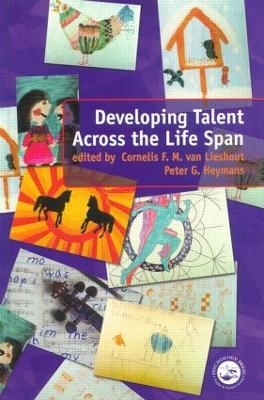
Developing Talent Across the Lifespan
Psychology Press Ltd (Verlag)
978-0-86377-556-7 (ISBN)
This volume presents fascinating new theoretical perspectives and empirical findings on the life-span development of talent. It shows how talents are the result of the acquisition of a sequence of skills and how the acquisition of these skills is facilitated by changes in the individual's environment. It explores to what degree the development of high intelligence or achievement is similar to the development of specific domains such as personality, morality, painting, musical performance, or professional skills. It questions whether the development of talent observed for specific groups is similar to individual cases and how the different numbers of highly talented women and men in several domains are to be explained.
Peter Heymans, Cornelis F. M. Van Lieshout
: Introduction. Part One: Conceptual Perspectives on the Development of Talent. 1.D.H. Feldman, Developmental theory and the Expression of Gifts and Talents. Introduction. The Need for a Framework to Guide Research and Practice. Towards a Framework for the Study of Giftedness and Talent. The Universal to Unique Continuum. The Development of Gifts and Talents. The Evolution of Gifts and Talents. Conclusion. 2.Ad W. Smitsman, Slumbering Talents: Where Do they Reside? Introduction. Talents as Hidden Core: Preformism and Unwanted Dichotomies. Development and the Organism-Environment System. The Significance of the Environment for an Organism's Developing Capabilities. Enhancement of Capabilities to Act by tool Use. Conclusion . Part Two: Intellectual Giftedness. 3.R.J. Sternberg, Successful Intelligence: A Unified View of Giftedness. The Concept of Successful Intelligence. Components of Successful Intelligence. Putting together the Three aspects of Successful Intelligence. Acknowledgement. 4.F.E. Weinert, E.A. Hany, The Role of Intelligence as a Major Determinant of a Successful Occupational Life. Introduction. The GOLD Study: Method. Results. General Discussion and Concluding Remarks. Part Three: Specific Talents: Personality, Morality, Emotionality, Academic Achievement, and Art. 5.C.F.M. Van Lieshout, R.H.J. Scholte, M.A.G. Van Aken, G.J.T. Haselager, J. M. Riksen-Walraven, The Gifted Personality: Resilient Children and Adolescents, Their Adjustment and their Relationships. Different Approaches to Personality. Resilience Across the Primary School Years. Resilient Adolescents. Subtypes of Resilient Children and Adolescents. Agentic and Communal Resilients, Perceived Support, and Sociometric Status. Boys Versus Girls. Conclusions. 6.T. Olthof, The Morality Paradox: Choosing Not to Be Moral as a Component of Moral Excellence. Introduction. The Nature of Morality. Moral Excellence. The Case of R. The Hazards of Untamed Moral Commitment. In Search of Moral Excellence: Beyond the Fusion of Goals. Acknowledgements. 7.P. Heymans, Talent For Development: Responding to Contextual Promises. Introduction. The Developmental Nexus and Its Dependence On Symbolic Structures. Young Marc Making A Developmental Opportunity Come True. Concluding Observations. Acknowledgement. 8.H.W. Stevenson, S. Lee, X. Mu, Successful Achievement In Mathematics: China and the United States. Introduction. Academic Achievement In China. High Achievers In China and the United States. Conclusions. 9. W. Deutsch, It's (Im)Possible to Become A Genius! the Development of Drawing. Introduction. A Short Survey About Drawing. The Documentation of Children's Drawings. The Development of Drawing: Three Individual Case Studies. Development and Talent. Acknowledgements. Part Four: Supporting the Development of Talent. 10.J.M. Riksen-Walraven, J. Zevalkink, Gifted Infants: What Kinds of Support Do they Need? The Role of Experience In the Development of Talents. A Supportive Environment For Gifted Infants is One That Fosters Competence. Motivation. Quality of Support Provided By Parents. Quality of Parental Support and Achievement of Excellence In Surinamese-Dutch Infants. Conclusions: Back to the Beginning. 11.J. Freeman, Teaching For Talent: Lessons From the Research. Problems of Definitions. Some Specific Research Concerns. How the Talented are Different. Educating for the Development of Talent. Current Trends In Developing Talent. Conclusions. 12.R.F. Subotnik, The Juilliard Model For Developing Young Adolescent Performers: An Educational Prototype. Introduction: The Juilliard School. Structure of the Study. Explicit Talent-Development Variables. More Implicit Talent-Development Variables. Conclusions. Note. 13. H.J.M. Hermans, M.F. Poulie, Talent and Self-narrative: The Survival of an Underachieving Adolescent. The
| Erscheint lt. Verlag | 16.3.2000 |
|---|---|
| Verlagsort | Hove |
| Sprache | englisch |
| Maße | 156 x 234 mm |
| Gewicht | 810 g |
| Themenwelt | Geisteswissenschaften ► Psychologie ► Allgemeine Psychologie |
| Geisteswissenschaften ► Psychologie ► Biopsychologie / Neurowissenschaften | |
| Geisteswissenschaften ► Psychologie ► Entwicklungspsychologie | |
| Geisteswissenschaften ► Psychologie ► Verhaltenstherapie | |
| Sozialwissenschaften ► Pädagogik ► Berufspädagogik | |
| ISBN-10 | 0-86377-556-X / 086377556X |
| ISBN-13 | 978-0-86377-556-7 / 9780863775567 |
| Zustand | Neuware |
| Haben Sie eine Frage zum Produkt? |
aus dem Bereich


